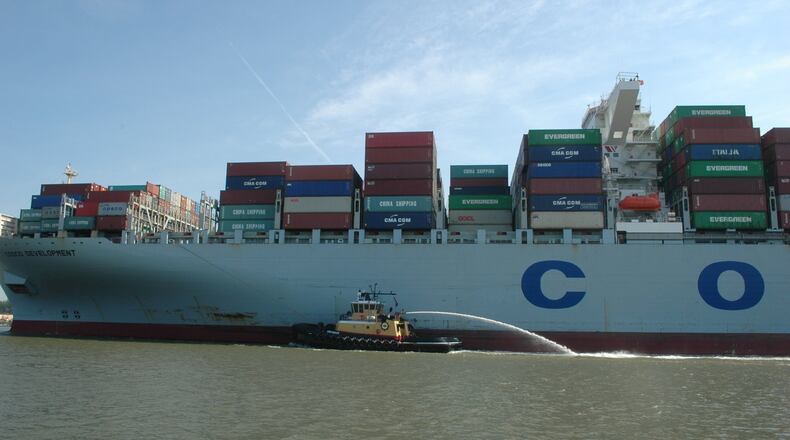The Trump administration shortchanged one of Georgia’s top economic priorities on Monday after it proposed funding Savannah harbor deepening work at half the rate boosters wanted for the 2019 budget year.
The U.S. Army Corps of Engineers called on Congress to appropriate $49 million for the dredging project in the fiscal year that begins Oct. 1. That's far short of the $100 million the port and Georgia delegation were aiming for in the upcoming year.
Ryan Fisher, principal deputy assistant secretary of the Army for civil works, said the proposed funding level for the Savannah port reflected “tough choices” in the federal budget.
“You look across the spectrum of the budget, performance-based criteria, what is affordable and the appropriate amount of investment at this time, which is what I believe this reflects for the Savannah harbor,” Fisher said.
He added that the Trump administration did not have any concerns with the roughly $1 billion project’s viability.
The proposed funding level left the Georgia Port Authority, which is nearly halfway done with dredging work to deepen the harbor from 42 feet to 47 feet, disappointed.
“It’s not the high water mark the delegation has requested that we obviously were supportive of,” said Jamie McCurry, chief administrative officer of the ports authority.
The Savannah port did come out of Monday’s budget rollout in better shape than many similar harbor deepening projects, including those in Boston and Charleston, S.C. Overall, the Trump administration called for slashing the Army Corps’ construction budget by 50 percent compared to current spending levels.
The White House said it would like to focus on investing in projects with “high economic or environmental returns while addressing public safety.” It proposed halting any new projects in order to finish ongoing projects like Savannah "faster for less cost, allowing the affected communities to see their benefits sooner.”
Congress is likely to fund the Army Corps at a higher overall funding level than that proposed by Trump given that such projects are politically popular. But lawmakers are prohibited from singling out specific projects for additional funding under the earmark ban. That means the funding levels the executive branch proposes for individual projects like Savannah is generally what Congress will approve at the end of the day.
The White House's 2019 number mirrors the funding level Trump proposed in his 2018 budget last year -- money Congress has yet to finalize.
Georgia lawmakers previously warned that keeping funding flat at $50 million would delay the project’s completion by five years, cost an additional $56 million because of inflation and generate an “irretrievable, cumulative loss” of $1.4 billion in annual economic benefits.
Even though Monday brought unwelcome news for the Savannah project, there is still a chance the port could see more federal money in the months ahead.
Congress is expected to finalize fiscal 2018 funding by the end of March, including $50 million for the dredging project. As a way to get around the earmark ban, lawmakers sometimes beef up funding for a broader construction account at the Army Corps of Engineers -- extra money bureaucrats could decide to give Savannah later. With the new budget agreement setting aside more than $130 billion in new domestic spending, it’s possible some new dollars could trickle down to politically popular agencies such as the Army Corps.
“Congress has made a point that infrastructure is a priority, and we feel like with the new budget deal we will hopefully see the type of number in the work plan that will reflect all that talk,” McCurry said.
Savannah’s backers aimed to put a positive spin on Monday’s news. Even though the Trump administration proposed setting aside less money than port boosters had desired, it was still more money than the White House proposed for other ongoing construction projects, noted Gov. Nathan Deal.
“I am encouraged to see that SHEP was President Trump’s top priority when it comes to port investments,” the Republican said in a statement.
The Trump administration on Monday also unveiled a new $1.5 trillion infrastructure plan. Details about which specific types of projects could qualify for the $200 billion in proposed federal funding were not available, but it’s possible Savannah could see money under such a plan if Congress were to approve it.
Read more: Savannah port looks to Trump to keep deepening project afloat
About the Author
The Latest
Featured




